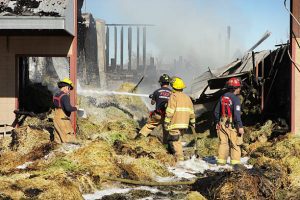Forensic science is a career field that is currently experiencing an intense amount of interest.
While most television shows about the career field tend to focus on forensic investigators, there are many careers in the field of forensic science.
If you’re curious about the science or if you just want to work in law enforcement, consider these options.
1. Crime Scene Investigator

Why Become a Crime Scene Investigator?
Crime scene investigators are probably the first career field that comes to mind when they think about forensic science.
These investigators are responsible for analyzing a crime scene; they review everything from the placement of evidence to the types of substances that are found in order to construct a picture of what occurred.
Crime scene investigators are usually employed by municipal police departments and federal investigative agencies.
| Crime Scene Investigator Key Stats | |
|---|---|
| Avg. Salary / year | $98,770 |
| Avg. Pay / hour | $47.48 |
| Education | 4+ Years |
| Job Outlook | 14% |
| Total Employed | 110,790 |
Read the full career guide: How to Become a Crime Scene Investigator
2. Police Detective

Why Become a Police Detective?
Police detectives incorporate data from crime scene investigators, laboratories, and combine it with interviews of persons of interest in order to determine a sequence of events at a crime scene.
In smaller communities, police detectives must also fulfill the roles of crime scene investigators.
Police detectives work long hours, but their jobs are different from day today.
This is an ideal profession for people who want a job with a lot of excitement.
| Police Detective Key Stats | |
|---|---|
| Avg. Salary / year | $98,770 |
| Avg. Pay / hour | $47.48 |
| Education | 3-4 Years |
| Job Outlook | 3% |
| Total Employed | 110,790 |
Read the full career guide: How to Become a Police Detective
3. Forensic Scientist

Why Become a Forensic Scientist?
A forensic scientist reviews the evidence that is collected by Crime Scene Investigators.
While the popular image of people in this career field is scientists in lab coats, actual forensic scientists have jobs that frequently take them out of the laboratory.
A forensic scientist is a job that can be either very routine or have a lot of variety depending on the type of laboratory you choose to work for.
Salaries vary based on whether forensic scientists work in the private sector or for the government.
| Forensic Scientist Key Stats | |
|---|---|
| Avg. Salary / year | $75,260 |
| Avg. Pay / hour | $36.18 |
| Education | 4+ Years |
| Job Outlook | 14% |
| Total Employed | 19,450 |
Read the full career guide: How to Become a Forensic Scientist
4. Toxicologist

Why Become a Toxicologist?
Toxicologists test various fluid samples to determine the type and amount of substances an individual has consumed.
Toxicologists are often thought of as a specialized field for forensic scientists, but the truth is that these are two very different careers paths with not a lot of overlap.
Toxicologists must have specialized training and often work alongside other medical specialists in private laboratories.
Only large municipalities tend to employ dedicated toxicologists.
| Toxicologist Key Stats | |
|---|---|
| Avg. Salary / year | $61,300 |
| Avg. Pay / hour | $29.47 |
| Education | 4+ Years |
| Job Outlook | 8% |
| Total Employed | 55,640 |
Read the full career guide: How to Become a Toxicologist
5. Forensic Accountant

Why Become a Forensic Accountant?
Forensic accountants are a little-known branch of forensics, but it’s a field that is experiencing a surge of demand.
This specialized field of accounting has people who go through the financial records of an institution in order to find evidence of a white-collar crime.
A background in accounting is crucial, and many forensic accountants have years of experience working for the type of firms that they investigate.
| Forensic Accountant Key Stats | |
|---|---|
| Avg. Salary / year | $93,520 |
| Avg. Pay / hour | $44.96 |
| Education | 4+ Years |
| Job Outlook | 22% |
Read the full career guide: How to Become a Forensic Accountant
6. Arson Investigator

Why Become an Arson Investigator?
Arson investigators are a specialized field of forensic scientists who work to determine the cause of fires.
While smaller municipalities assign these investigations to the fire department, the recent increase in these types of crimes has led to the need for specialized, impartial investigators.
Specialized training is a requirement, and many arson investigators take an extra set of classes in order to specialize in this career field.
| Arson Investigator Key Stats | |
|---|---|
| Avg. Salary / year | $87,440 |
| Avg. Pay / hour | $42.04 |
| Education | 1-2 Years |
| Job Outlook | 6% |
| Total Employed | 14,050 |
Read the full career guide: How to Become an Arson Investigator
7. Chemist

Why Become a Chemist?
Chemists are needed in practically all areas of technology and manufacturing, so it’s not so surprising that they can also be useful in the field of forensic science.
Chemists can be involved with many different parts of an investigation, they can assist toxicologists, forensic scientists, and even arson investigators.
Typical jobs can include analyzing substances found at a crime scene or determining the type of accelerant used in a fire.
| Chemist Key Stats | |
|---|---|
| Avg. Salary / year | $95,940 |
| Avg. Pay / hour | $46.13 |
| Education | 4+ Years |
| Job Outlook | 6.5% |
| Total Employed | 83,250 |
Read the full career guide: How to Become a Chemist
8. Marine Biologist

Why Become a Marine Biologist?
You might not expect to see marine biologists on this list, but as the number of crimes against the environment increases, many law enforcement agencies have started to employ marine biologists.
These scientists can report on changes in local wildlife and ocean conditions, providing evidence in cases related to illegal industrial spills, cargo ship leakage, and other maritime crimes.
| Marine Biologist Key Stats | |
|---|---|
| Avg. Salary / year | $100,440 |
| Avg. Pay / hour | $48.29 |
| Education | 4+ Years |
| Job Outlook | 5% |
| Total Employed | 59,710 |
Read the full career guide: How to Become a Marine Biologist
9. Radiologist

Why Become a Radiologist?
Radiologists review x-rays and other types of medical imaging.
In criminal cases, these pictures are used as evidence of violent crimes, including domestic abuse, assault, and murder.
Radiologists must have specialized training, and in smaller municipalities, they also work in the medical field while taking on work for law enforcement on a contractual basis.
In larger areas, it is not uncommon to have a full-time radiologist employed by local law enforcement officials.
| Radiologist Key Stats | |
|---|---|
| Avg. Salary / year | $79,760 |
| Avg. Pay / hour | $38.35 |
| Education | 4+ Years |
| Job Outlook | 7% |
| Total Employed | 223,460 |
Read the full career guide: How to Become a Radiologist
10. Medical Researcher

Why Become a Medical Researcher?
Medical researchers most often work alongside chemists to identify the effects of new drugs and other substances found at crime scenes.
They can also take a “big picture” approach in researching the effects of a new drug on a local population.
| Medical Researcher Key Stats | |
|---|---|
| Avg. Salary / year | $95,200 |
| Avg. Pay / hour | $45.77 |
| Education | 4+ Years |
| Job Outlook | 8% |
| Total Employed | 19,760 |
Read the full career guide: How to Become a Medical Researcher
11. Social Worker

Why Become a Social Worker?
Social workers often delay with the aftermath of crimes.
They are most often used to help interview victims who are considered to be at-risk, usually children, the elderly, and the mentally disabled.
| Social Worker Key Stats | |
|---|---|
| Avg. Salary / year | $74,680 |
| Avg. Pay / hour | $35.91 |
| Education | 3-4 Years |
| Job Outlook | 8.3% |
| Total Employed | 64,940 |
Read the full career guide: How to Become a Social Worker
12. Registered Nurse

Why Become a Registered Nurse?
RNs are able to assist with the diagnosis and treatment of victims of crime, as well as collect evidence from victims such as rape kits.
| Registered Nurse Key Stats | |
|---|---|
| Avg. Salary / year | $98,430 |
| Avg. Pay / hour | $47.32 |
| Education | 4+ Years |
| Job Outlook | 12% |
| Total Employed | 3,282,010 |
Read the full career guide: How to Become a Registered Nurse










